10 days in Iraq: Aid drops, air-strikes and 200,000 new refugees
- Published
Fighters from the Islamic State (IS), formerly known as Isis, expanded their areas of control in northern Iraq between 2 and 14 August.
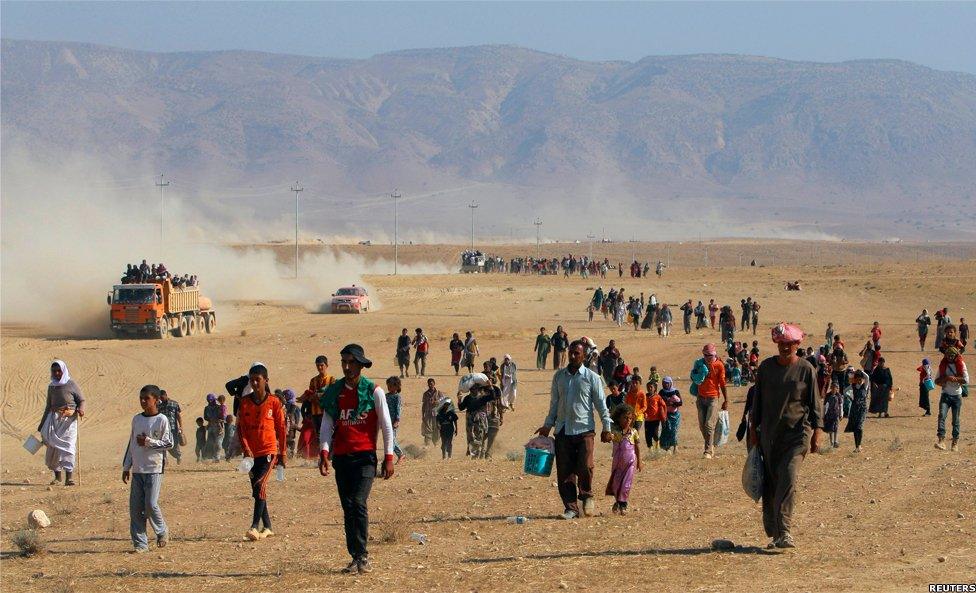
The IS advance forced thousands from their homes in the north-west cities of Qaraqosh and Sinjar, seeking safety in nearby Kurdish provinces.
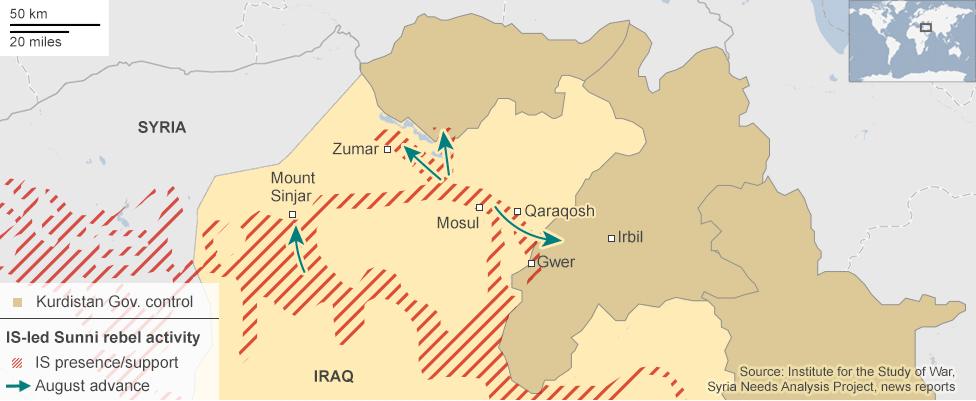

Saturday 2 August
Islamic State fighters take control of the town of Zumar, which Kurdish forces had held since the Iraqi army retreated from the area in June. Eyewitnesses said militants also seized control of two small oilfields near Zumar.
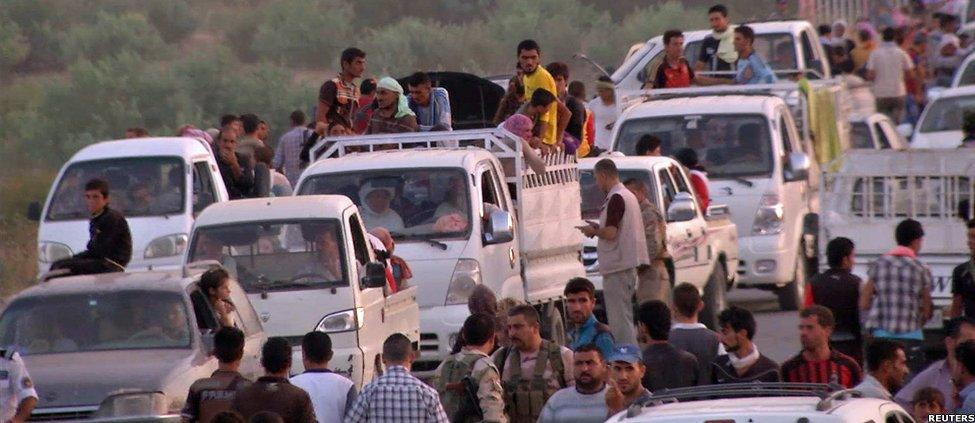
People fleeing into Kurdish territoritories after IS attack the towns of Sinjar and Zunmar

Sunday 3 August
IS militants take over the town of Sinjar, home to a large community of the Kurdish Yazidi religious minority community.
The UN warns that up to 200,000 people have been forced to flee their homes in recent days.
At least 50,000 members of the Yazidi religious minority community are trapped on Mount Sinjar.
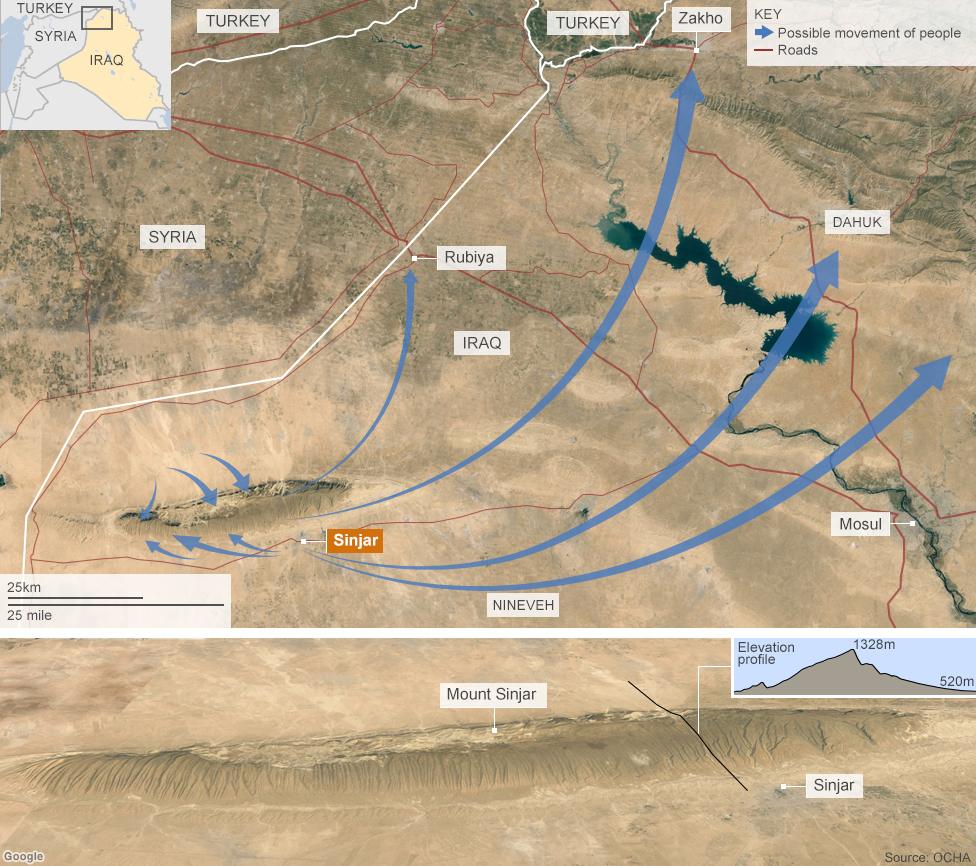
Tens of thousands of Iraqi Christians and Yazidis are understood to have fled their homes, as James Robbins reports
The militants also take control of Mosul's hydroelectric dam after the withdrawal of Kurdish forces.
The dam is of huge strategic significance in terms of water and power resources.
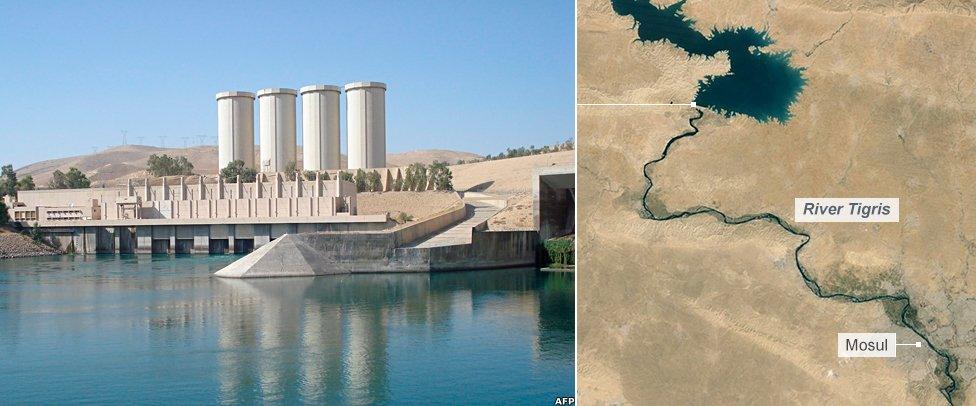
The dam is the largest in Iraq and provides much of Mosul's electricity

Wednesday 6 August
In Baghdad a series of car bombs strike crowded markets in Shia districts, killing at least 47 people.
The Iraqi Prime Minister, Nouri Maliki, comes under pressure to step down due to his handling of the crisis.
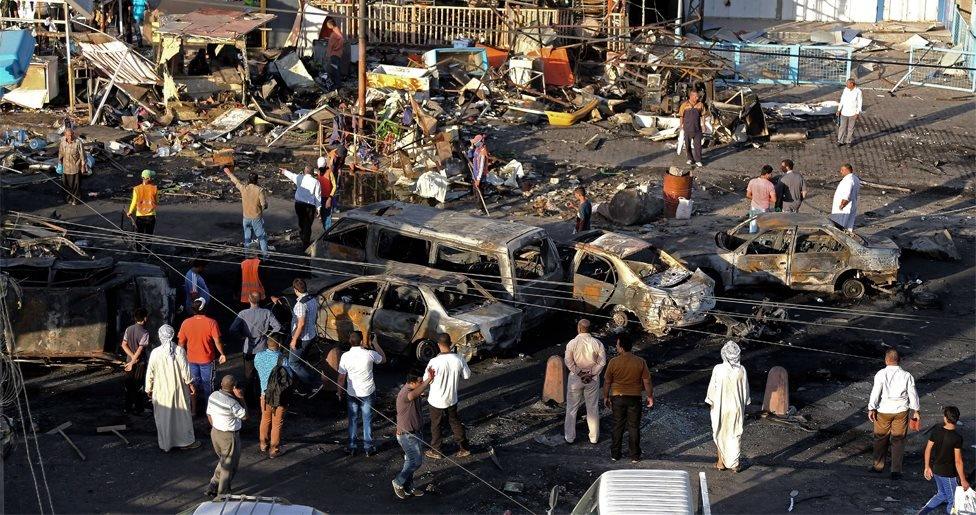
Car bombs are detonated in several neighborhoods in Baghdad, Iraq
Iraqi and Kurdish forces attack Mosul, which IS has declared the capital of its Islamic caliphate.
At least 60 people are reported killed in an Iraqi air strike on a building in Mosul, while Kurdish forces shell the city's northern and eastern districts.
Mosul is a key trading hub close to the Syrian and Turkish borders

Thursday 7 August
Islamic State militants capture Qaraqosh, considered the centre of Iraq's Christian community.
As many as 100,000 people in the surrounding province of Nineveh are believed to be fleeing toward the autonomous Kurdistan Region.

US military aircraft drop food and water to Yazidis trapped on Mount Sinjar by IS fighters.
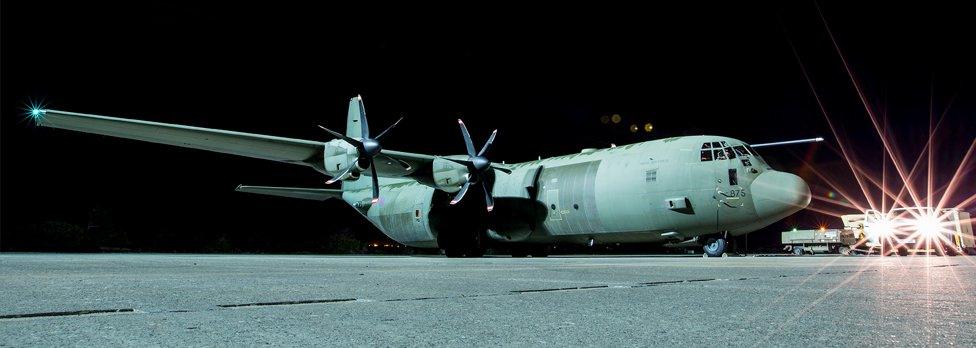
RAF Hercules aircraft prepares for an airdrop of humanitarian aid packages
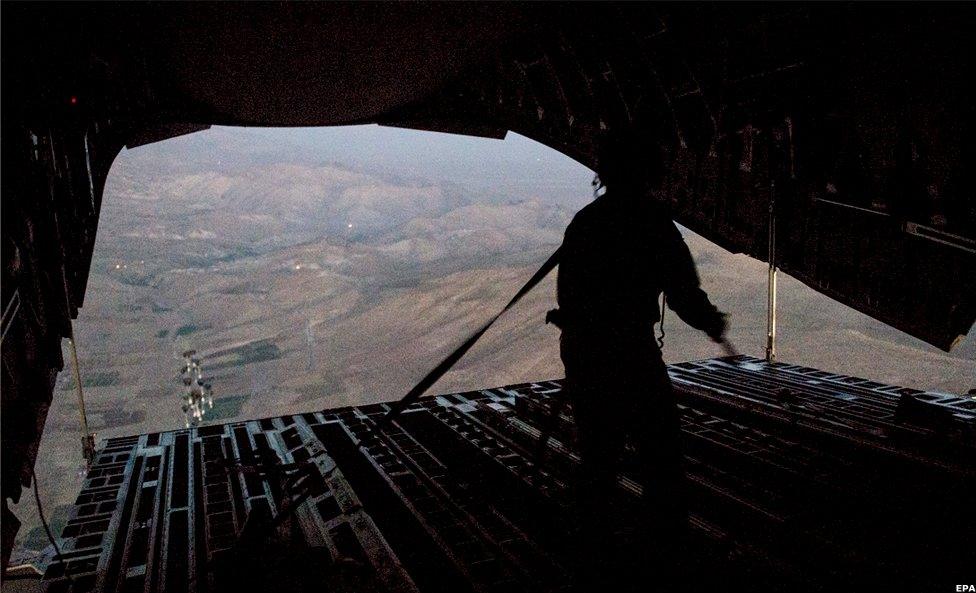
US humanitarian airdrop over Mount Sinjar
Humanitarian aid flights
30,000
people trapped on Mount Sinjar surrounded by Islamic militants
-
85,928 ready-to eat meals have been dropped by US flights along with
-
20,151 gallons of fresh water
-
528 shelter kits have been dropped by RAF along with water containers and
-
1,056 solar lanterns which can be used to recharge mobile phones
The United Nations Security Council meets in an emergency session to discuss the situation.
Pope Francis makes an impassioned appeal to the international community to do much more to address the crisis.

Friday 8 August
The US launches air strikes against IS militants - the first time the US has been directly involved in a military operation in Iraq since American troops withdrew in late 2011.
The Pentagon reports that drones and F/A-18 Hornets aircraft, operating from a carrier in the Gulf, dropped laser-guided bombs on mobile artillery near the city of Irbil.
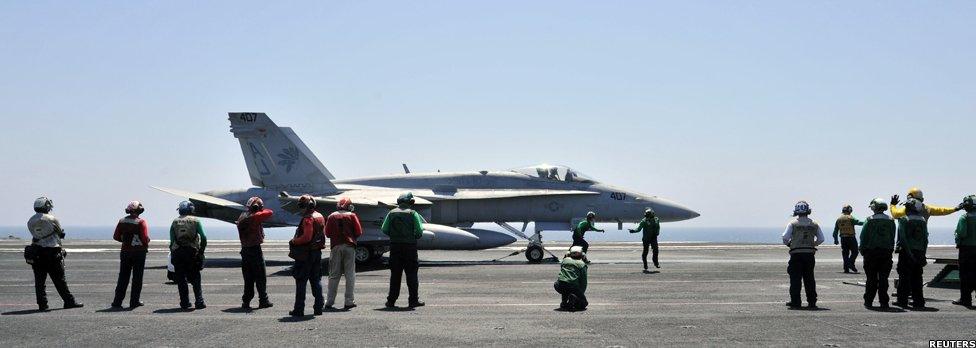
A F/A-18C Hornet aboard the aircraft carrier USS George HW Bush
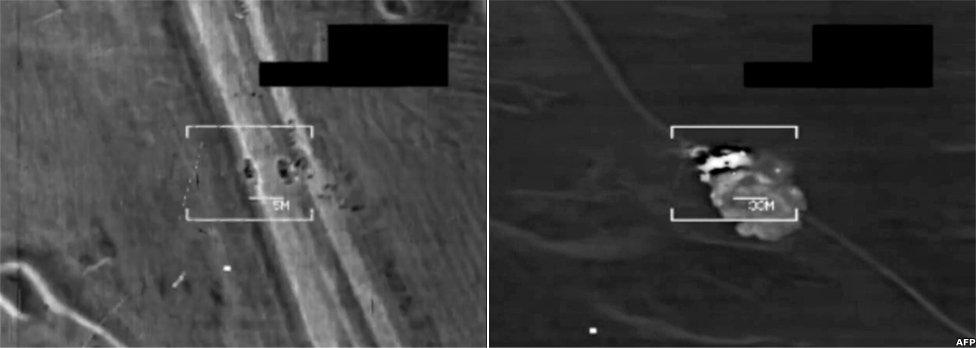
Stills from a video of a US air-strikes in northern Iraq on 8 August 2014
The BBC's Rajini Vaidyanathan reports on air strikes and aid drops in Iraq
The United Nations says it is working on opening a humanitarian corridor in northern Iraq to allow stranded people to flee.

Saturday 9 August
The US make a third air-drop of food and water to refugees on Mount Sinjar, as Britain and France join the relief effort.
Unicef's Juliette Touma says people in the Sinjar mountains are in desperate need of food, water, shelter and protection
President Obama says the US would consider broader use of military strikes, but puts pressure on Iraq's political leaders to figure out how to work with each other.
There is no American military solution to the larger crisis in Iraq

Sunday 10 August
US launches a fourth round of air strikes and Kurdish forces claim to have regained control of Gwer and Makhmur after heavy fighting.
The political leader of Iraq's Kurds, Massoud Barzani, appeals for international military aid to help defeat Islamist militants.

Monday 11 August
IS fighters seize the town of Jalawla, north-east of Baghdad.
The US is reported to have begun supplying weapons to Kurdish fighters. This follows three plane-loads of ammunition already delivered by Iraqi security forces.
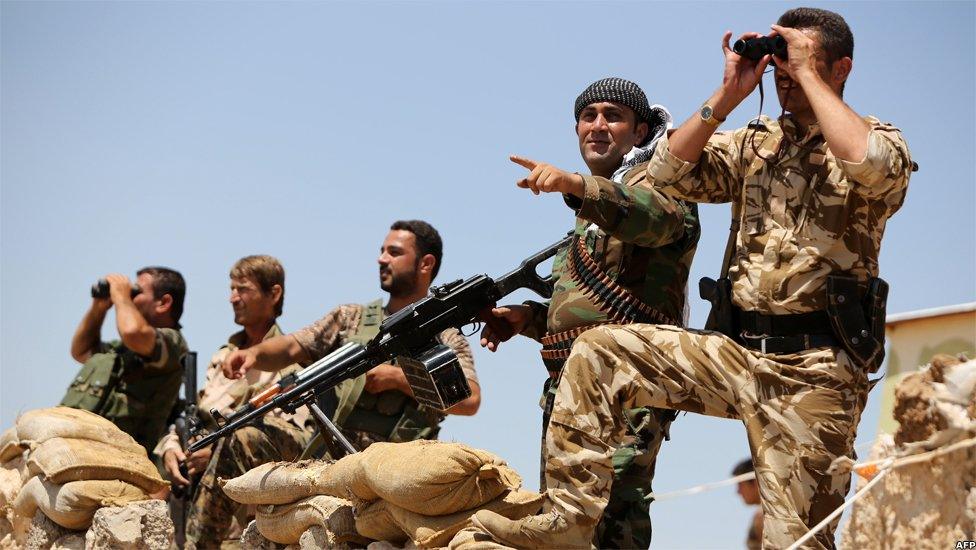
Kurdish fighters are receiving increased support from the US and the Iraqi government
The BBC's Caroline Wyatt has travelled west of Irbil to meet Kurdish forces battling the Islamic State
Iraq's president asks Haider al-Abadi to form a new cabinet. Mr Abadi's appointment comes after months of political infighting, which analysts say is partially to blame for Iraq's inability to effectively fight the IS threat.

Tuesday 12 August
A Kurdish government helicopter delivering aid crashes on Mount Sinjar, killing the pilot and injuring a journalist.
The US government says its planes have air-dropped nearly 100,000 meals and more than 27,000 gallons (123,000 litres) of fresh drinking water to the area, with the latest operation taking place on Tuesday.
However, tens of thousands of civilians remain trapped on the mountain and need "life-saving assistance", the UN warns.

Thursday 14 August
The US says it is unlikely to launch a mission to evacuate people trapped on Mount Sinjar, following an assessment that there are fewer people on the mountain than previously thought.
US officials suggested that air-strikes in the region had created an escape route for thousands, who had managed to leave the mountain over the past few nights, helped by Kurdish fighters.
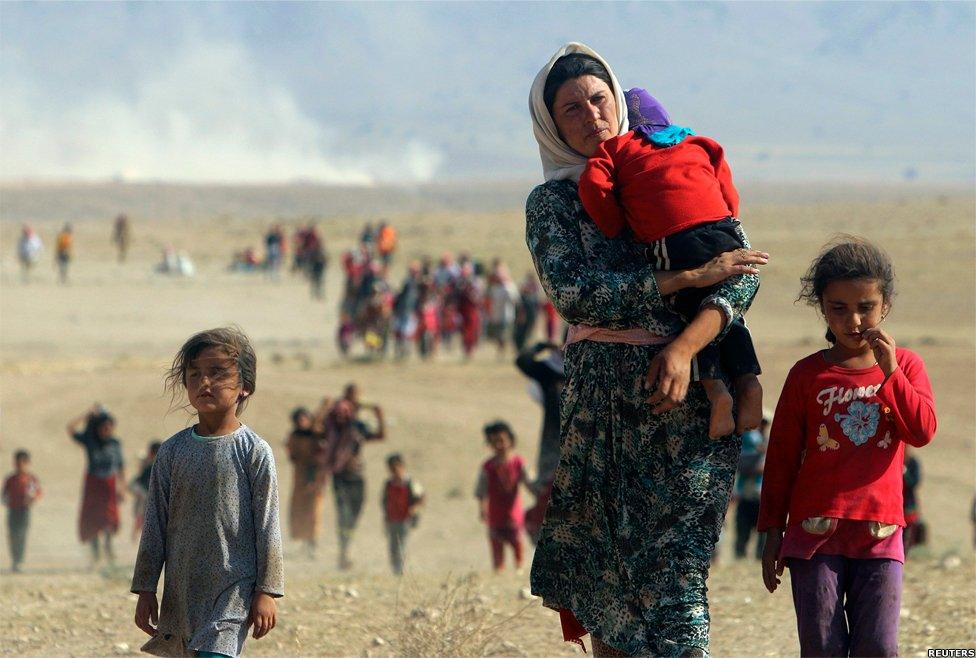
People from the minority Yazidi sect flee on foot from Sinjar mountain towards the Syrian border